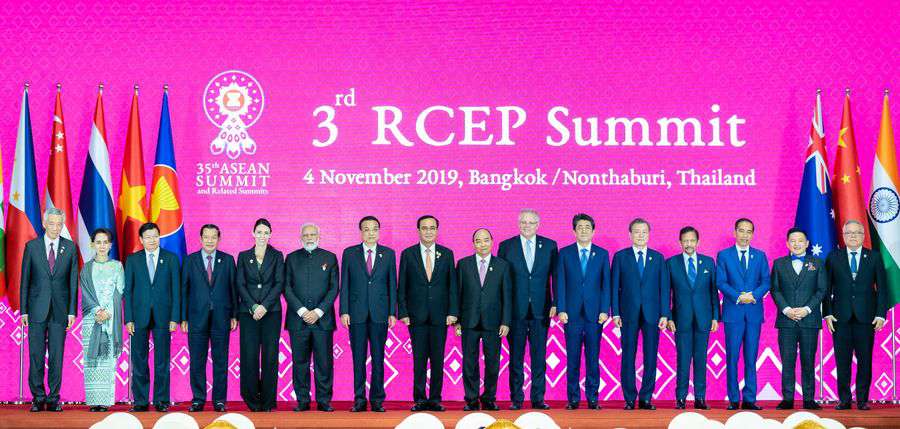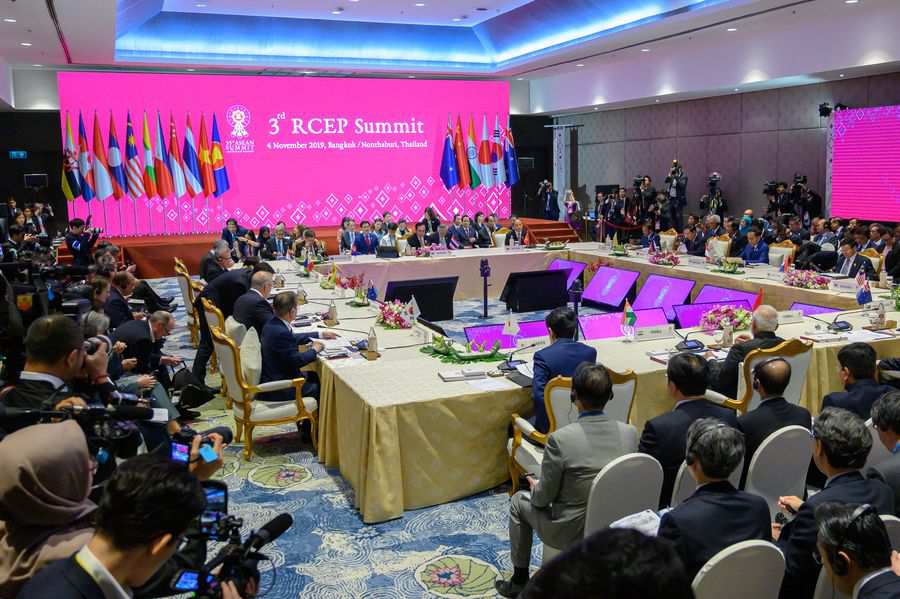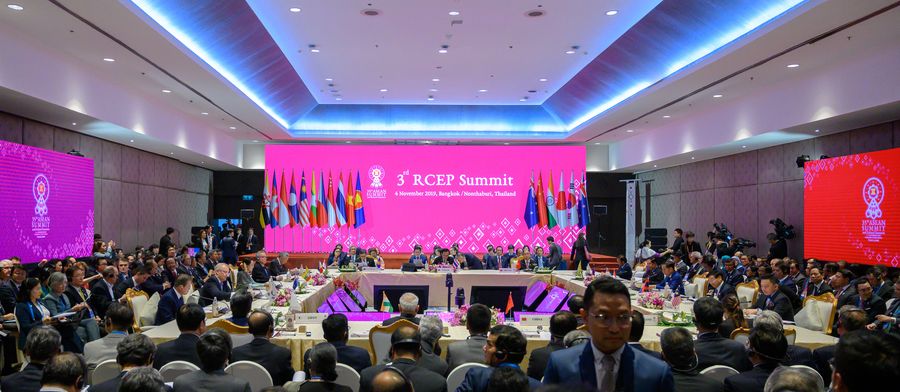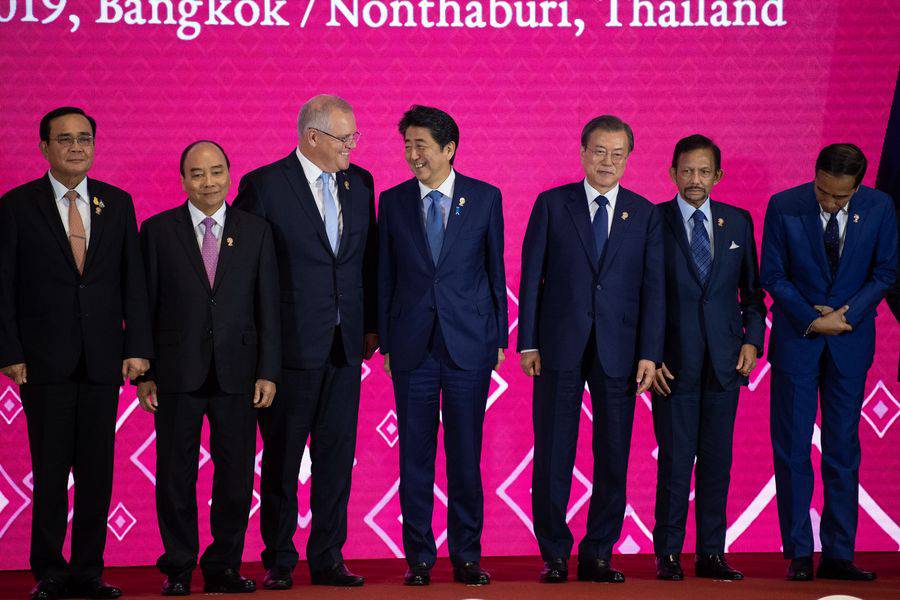


Chinese Premier Li Keqiang attends the 3rd Regional Comprehensive Economic Partnership (RCEP) Summit in Bangkok, Thailand, Nov. 4, 2019. (Xinhua/Zhai Jianlan)
Once signed, the RCEP will form the largest free-trade agreement in Asia, covering 47.4 percent of the world's population, and accounting for 32.2 percent of global GDP, 29.1 percent of trade worldwide and 32.5 percent of global investment.
BANGKOK, Nov. 4 -- Fifteen participating countries of the Regional Comprehensive Economic Partnership (RCEP) will start legal preparations for the signing of the mega free-trade pact in 2020, after concluding text-based negotiations and essentially all market access issues.
"Against the backdrop of a fast-changing global environment, the completion of the RCEP negotiations will demonstrate our collective commitment to an open trade and investment environment across the region," leaders of the RCEP countrie said in a joint statement at a summit here on Monday.
Chinese Premier Li Keqiang called the latest progress in the seven-year-long RCEP negotiations "a major breakthrough in the construction of an East Asia free trade area, which would boast the largest population, most diversified membership and greatest potential for development."

Participants attend the 3rd Regional Comprehensive Economic Partnership (RCEP) Summit in Bangkok, Thailand, Nov. 4, 2019. (Xinhua/Zhu Wei)
SIGNING NEXT YEAR
The RCEP agreement is "intended to further expand and deepen regional value chains for the benefits of our businesses, including small and medium enterprises, as well as our workers, producers, and consumers," the leaders said in the statement, noting they have tasked legal scrubbing to start for signing in 2020.
Officially launched in 2012, the RCEP brings together the 10 member countries of the Association of Southeast Asian Nations (ASEAN) and their six trade partners in the region, namely China, Japan, South Korea, India, Australia and New Zealand.
Once signed, it will form the largest free-trade agreement in Asia, covering 47.4 percent of the world's population, and accounting for 32.2 percent of global GDP, 29.1 percent of trade worldwide and 32.5 percent of global investment.
"ASEAN will benefit from increased market access to trading partners," Thai Prime Minister Prayut Chan-o-cha said after hosting the 35th ASEAN summit and related meetings.
However, the breakthrough deal did not include India, which still has significant outstanding issues with other members.
"All RCEP participating countries will work together to resolve these outstanding issues in a mutually satisfactory way," the leaders said in the statement. "India's final decision will depend on satisfactory resolution of these issues."
Zhang Xuegang, researcher and vice president of the Southeast Asia and Oceania Research Center of China Institute of Contemporary International Relations, said the RCEP negotiations involved pragmatic areas including each country's industries, market access and trade balance, "which are directly related to people's livelihood."
"It is reasonable that the countries have been cautious in the talks," Zhang said.

Participants attend the 3rd Regional Comprehensive Economic Partnership (RCEP) Summit in Bangkok, Thailand, Nov. 4, 2019. (Xinhua/Zhu Wei)
LARGEST WIN-WIN AGREEMENT
"The RCEP is a multilateral trade cooperation, which means its structure is truly meant to benefit all participating countries because all will be governed under the same trade rules," Neak Chandarith, director of the Cambodia 21st Century Maritime Silk Road Research Center (CMSRRC) of the Royal University of Phnom Penh, told Xinhua.
The RCEP will reduce trade barriers coupled with enhanced market access and will make each RCEP member more attractive to foreign investors and encourage cross-border investments amongst RCEP members, he added.
It will have a positive role in boosting economic development of all participating countries, and will help them integrate further with the global economy, said Yu Miaojie, vice president of National School of Development at Peking University.
"The three major areas of goods trade, services trade and investment will be greatly enhanced among the participating countries, thus also strongly boosting the cultural and people-to-people exchanges among the countries," Yu told Xinhua.
The RCEP will also promote trade liberalization in the region, further entrenching the region's importance to economic growth and global trade. "All sides will benefit from this pact when it becomes a reality," Cambodian Ministry of Commerce Undersecretary of State and Spokesman Seang Thay said.
According to Joseph Matthews, a senior professor at the BELTEI International University in Phnom Penh, the RCEP will open a new door of opportunity for the least developed countries such as Cambodia, Laos, Vietnam and Myanmar in the bloc.
The end result of the RCEP will be the largest "win-win agreement and partnership of its own kind that has never been reached in the world," he said.

(From L to R) Thai Prime Minister Prayut Chan-o-cha, Vietnamese Prime Minister Nguyen Xuan Phuc, Australian Prime Minister Scott Morrison, Japanese Prime Minister Shinzo Abe, South Korean President Moon Jae-in, Brunei Sultan Haji Hassanal Bolkiah and Indonesian President Joko Widodo react during a photo session of the 3rd Regional Comprehensive Economic Partnership (RCEP) Summit in Bangkok, Thailand, Nov. 4, 2019. (Xinhua/Zhu Wei)
COUNTER PROTECTIONISM
Chheang Vannarith, president of the Phnom Penh-based Asian Vision Institute, said the RCEP embeds both economic and strategic principles between ASEAN and the six countries, and it will contribute to promoting a multilateral trading system.
"It will be a big push to counter protectionism and unilateralism," he told Xinhua.
Mey Kalyan, a senior advisor to Cambodia's Supreme National Economic Council, said the conclusion of the RCEP will definitely have great importance at a time when the world economy is losing its balance due to uncertainty, protectionism and unilateralism.
"The RCEP is expected to bring a sense of certainty and normalcy, although it will still have only a small impact at its early stage," he said.
Aaron Jed Rabena, a research fellow at the Manila-based think tank Asia Pacific Pathways to Progress Foundation, told Xinhua that the conclusion of negotiations and the implementation of the RCEP will open up new alternative markets for the participating countries and help them ward off protectionist measures.
"It (RCEP) is not just a testament to liberalized trade among ASEAN members and partners. It is also a proof that many countries are in support of freer trade, an open global economy, and uphold the credibility of international regimes," Rabena said.
"RCEP will have a significant effect in shaping the present world economy by ensuring that more countries through a multilateral FTA still prefer or are committed to liberalized trade," Rabena added.
(Xinhua reporters Yuan Mengchen from Manila and Lin Hao from Kuala Lumpur also contributed to the story.)

 Award-winning photos show poverty reduction achievements in NE China's Jilin province
Award-winning photos show poverty reduction achievements in NE China's Jilin province People dance to greet advent of New Year in Ameiqituo Town, Guizhou
People dance to greet advent of New Year in Ameiqituo Town, Guizhou Fire brigade in Shanghai holds group wedding
Fire brigade in Shanghai holds group wedding Tourists enjoy ice sculptures in Datan Town, north China
Tourists enjoy ice sculptures in Datan Town, north China Sunset scenery of Dayan Pagoda in Xi'an
Sunset scenery of Dayan Pagoda in Xi'an Tourists have fun at scenic spot in Nanlong Town, NW China
Tourists have fun at scenic spot in Nanlong Town, NW China Harbin attracts tourists by making best use of ice in winter
Harbin attracts tourists by making best use of ice in winter In pics: FIS Alpine Ski Women's World Cup Slalom
In pics: FIS Alpine Ski Women's World Cup Slalom Black-necked cranes rest at reservoir in Lhunzhub County, Lhasa
Black-necked cranes rest at reservoir in Lhunzhub County, Lhasa China's FAST telescope will be available to foreign scientists in April
China's FAST telescope will be available to foreign scientists in April